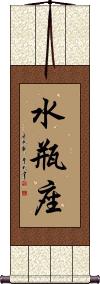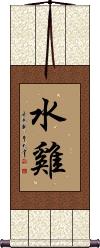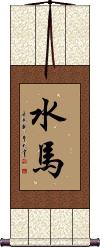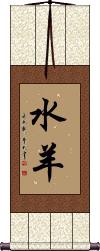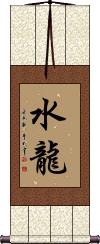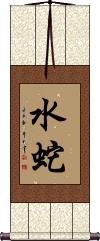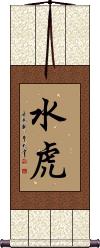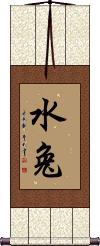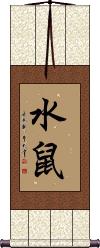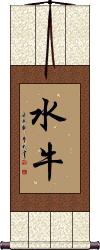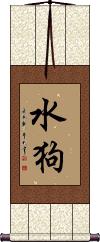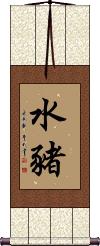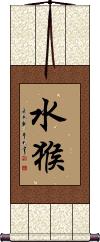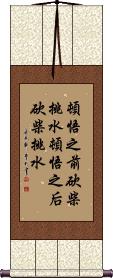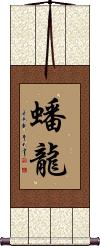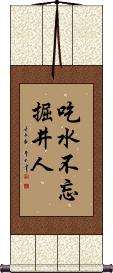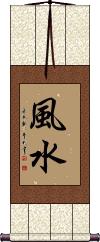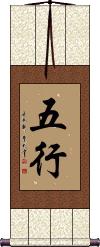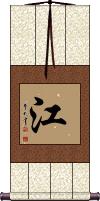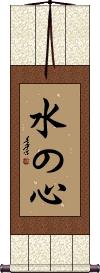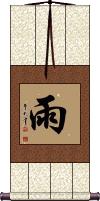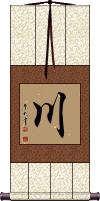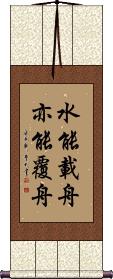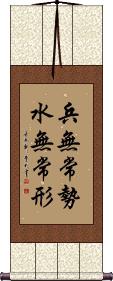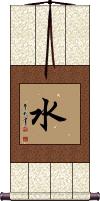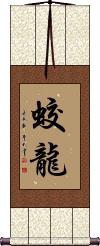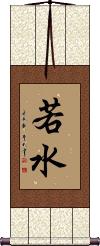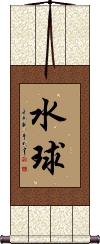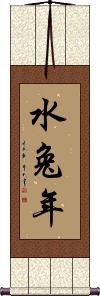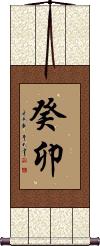Buy a Custom Aquarius Zodiac Chinese or Japanese Calligraphy Wall Scroll
We have many options to create artwork with the Chinese characters / Asian symbols / Japanese Kanji for Aquarius on a wall scroll or portrait.
Check out our Chinese Zodiac page to learn what your Chinese animal sign is, and more!
1. Aquarius
3. Water Horse
5. Water Dragon
6. Water Snake
7. Water Tiger
8. Water Rabbit
9. Water Rat
10. Water Ox/Bull
11. Water Dog
12. Water Pig/Boar
13. Water Monkey
14. Be Like Water
16. Water Dragon / Coiled Dragon
17. Drinking the water of a well: One should never forget who dug it
18. Dripping Water Penetrates Stone
20. Feng Shui
21. Fire and Water Have No Mercy
22. Five Elements
23. Flower in the Mirror, Moon on Water
24. Put out a burning wood cart with a cup of water
25. Ultimate Goodness of Water
26. Large River
27. Mind Like Water
28. Rain
29. River
30. Not Only Can Water Float A Boat, It Can Sink It Also
31. Warriors Adapt and Overcome
32. Water
33. Water Dragon / Rain Dragon
34. Be Like Water
35. Water Tiger
36. Water Polo
38. Water Rat
Aquarius Zodiac Symbol / Sign
水瓶座 is the Chinese and Japanese way to write Aquarius (water bearer) of western astrology.
See Also: Chinese Zodiac
Water Rooster
The Year of the Water Rooster
水雞 is Water Rooster in Chinese.
In the Chinese zodiac and sexagenary (60-year) cycle, this combination occurs in years that include 1873, 1933, 1993, and 2053.
In the sexagenary cycle, this year is represented by 癸酉.
See Also: Rooster
Water Horse
The Year of the Water Horse
水馬 is Water Horse in Chinese.
In the Chinese zodiac and sexagenary (60-year) cycle, this combination occurs in years that include 1882, 1942, 2002, and 2062.
In the sexagenary cycle, this year is represented by 壬午.
See Also: Horse
Water Goat/Sheep
The Year of the Water Goat/Sheep
水羊 is Water Goat/Sheep in Chinese.
In the Chinese zodiac and sexagenary (60-year) cycle, this combination occurs in years that include 1883, 1943, 2003, and 2063.
In the sexagenary cycle, this year is represented by 癸未.
See Also: Goat/Sheep
Water Dragon
The Year of the Water Dragon
水龍 is Water Dragon in Chinese.
In the Chinese zodiac and sexagenary (60-year) cycle, this combination occurs in years that include 1892, 1952, 2012, and 2072.
In the sexagenary cycle, this year is represented by 壬辰.
See Also: Dragon
Water Snake
The Year of the Water Snake
水蛇 is Water Snake in Chinese.
In the Chinese zodiac and sexagenary (60-year) cycle, this combination occurs in years that include 1893, 1953, 2013, and 2073.
In the sexagenary cycle, this year is represented by 癸巳.
See Also: Snake
Water Tiger
The Year of the Water Tiger
水虎 is Water Tiger in Chinese.
In the Chinese zodiac and sexagenary (60-year) cycle, this combination occurs in years that include 1902, 1962, 2022, and 2082.
In the sexagenary cycle, this year is represented by 壬寅.
See Also: Tiger
Water Rabbit
The Year of the Water Rabbit
水兔 is Water Rabbit in Chinese.
In the Chinese zodiac and sexagenary (60-year) cycle, this combination occurs in years that include 1903, 1963, 2023, and 2083.
In the sexagenary cycle, this year is represented by 癸卯.
See Also: Rabbit
Water Rat
The Year of the Water Rat
水鼠 is Water Rat in Chinese.
In the Chinese zodiac and sexagenary (60-year) cycle, this combination occurs in years that include 1912, 1972, 2032, and 2092.
In the sexagenary cycle, this year is represented by 壬子.
See Also: Rat
Water Ox/Bull
The Year of the Water Ox/Bull
水牛 is Water Ox/Bull in Chinese.
In the Chinese zodiac and sexagenary (60-year) cycle, this combination occurs in years that include 1913, 1973, 2033, and 2093.
In the sexagenary cycle, this year is represented by 癸丑.
See Also: Ox/Bull
Water Dog
The Year of the Water Dog
水狗 is Water Dog in Chinese.
In the Chinese zodiac and sexagenary (60-year) cycle, this combination occurs in years that include 1922, 1982, 2042, and 2102.
In the sexagenary cycle, this year is represented by 壬戌.
See Also: Dog
Water Pig/Boar
The Year of the Water Pig/Boar
水豬 is Water Pig/Boar in Chinese.
In the Chinese zodiac and sexagenary (60-year) cycle, this combination occurs in years that include 1923, 1983, 2043, and 2103.
In the sexagenary cycle, this year is represented by 癸亥.
See Also: Pig/Boar
Water Monkey
The Year of the Water Monkey
水猴 is Water Monkey in Chinese.
In the Chinese zodiac and sexagenary (60-year) cycle, this combination occurs in years that include 1872, 1932, 1992, and 2052.
In the sexagenary cycle, this year is represented by 壬申.
See Also: Monkey
Be Like Water
像水一樣 is a short quote from a much longer statement by Bruce Lee.
He summarized how people should be flexible to all circumstances, attacks, or situations. In the end, he exclaims, “Be like water, my friend.” 像水一樣 is the “Be like water” part alone since that seems to be what most people want.
Chop Wood, Carry Water
Before enlightenment or after, chores remain.
頓悟之前砍柴挑水; 頓悟之後砍柴挑水 means “Before enlightenment, chop wood, carry water; After enlightenment, chop wood, carry water.
This is a Chinese proverb that is attributed to 吴力 (Wú Lì) who lived between 1632 and 1718 - living part of his life as a devout Buddhist, and many years as a Catholic Jesuit Priest in China - what an interesting life!
This has been explained many times in many ways. I am a Buddhist, and here is my brief take on this proverb...
Before enlightenment, one may find daily chores mundane, tedious, and boring. However, upon reaching enlightenment one is not relieved of the details of daily life. An enlightened person will, however, see such chores as a joy, and do them mindfully.
There is another version floating around, which is 在你領悟之前砍柴、運水。在你領悟之後,砍柴、運水。
If you want this other version, just contact me. The meaning is the same, just different phrasing.
Water Dragon / Coiled Dragon
Drinking the water of a well: One should never forget who dug it
This proverb suggests that one should always be grateful to those who helped one succeed.
And remember your ancestors and those that came before you whose sacrifices made your present life better.
Some Chinese will separate the intended meaning from this proverb and translate this as “Don't forget the people who once helped you.” In Modern China, this idiom is virtually never used to refer to an actual well.
Note: This can be pronounced in Korean but it's not a commonly used phrase.
Dripping Water Penetrates Stone
滴水穿石 is a Chinese proverb that means, dripping water penetrates stone.
The figurative meaning can be translated as:
Constant perseverance yields success.
You can achieve your aim if you try hard without giving up.
Persistent effort overcomes any difficulty.
While 滴水穿石 is the most common character order, you will likely see 水滴石穿, might see 滴水石穿, and will rarely see 小水穿石 in the wild.
Earth Fire Water Air
Feng Shui
風水 is the famous technique and approach to arranging your home externally around natural features and internally to create balance and peace.
These two characters literally mean “wind water.” Obviously, the title is far more simple than the concept behind this subject.
It may enlighten you slightly to know that the character for “wind” can also mean style, custom, or manner in some contexts. This may apply somewhat to this title.
In a technical sense, this title is translated as Chinese geomancy.
Fire and Water Have No Mercy
Five Elements
五行 is the title of the five elements: wood, fire, water, earth, and metal.
The first character means five, and the second character is simply element(s).
According to ancient Chinese science, all matter in the world is comprised of these elements. One idea presented with the five elements is that when energy is added, the matter is believed to expand. When energy is removed, matter contracts. Oddly, this concept is not far from Einstein's theories and modern science. Just a few thousand years before Einstein.
More info: Wikipedia - Five Elements (Wu Xing).
See Also: Wood | Fire | Water | Earth | Metal | Five Elements
Five Elements
金木水火土 is a list of the Chinese characters for the five elements in a comfortable order (meaning that they “feel right” to a Chinese person who views this arrangement).
The order is metal, wood, water, fire, and earth.
Note that sometimes the metal element is translated as gold. And earth refers to soil versus the whole planet earth.
Five Elements
地水火風空 is the specifically-Japanese version of the five elements.
This is a little different than the ancient or original Chinese version.
The elements are written in this order:
1. Earth / Terra / Ground
2. Water
3. Fire
4. Wind / Air
5. Sky / Emptiness / Void / Ether
Note: This set of Kanji can also be romanized as “ji sui ka fuu kuu,” “jisuikafuukuu,” or “jisuikafuku.”
These can also be written in the order 地火風水空 (chi ka sui fuu kuu). Let me know when you place your order if you want the Kanji to be in this character order.
Flower in the Mirror, Moon on Water
鏡花水月 is an old Asian proverb that means “flowers in a mirror and the moon reflected in the lake” or “flowers reflected on a mirror and the moon reflected on the water's surface.”
Literally, 鏡花水月 reads “Mirror Flower, Water Moon.”
Figuratively this can be used to represent a lot of different ideas. It can be used to express an unrealistic rosy view or viewing things through rose-tinted spectacles. So you can use it to relay an idea about something that is visible but has no substance,
something that can be seen but not touched, or something beautiful but unattainable such as dreams or a mirage.
This expression is used to describe things like the subtle and profound beauty of poems that cannot be described in words.
鏡 = Mirror (or lens)
花 = Flower(s)
水 = Water
月 = Moon
Can also be written 水月鏡花 (just a slight change in word/character order).
Put out a burning wood cart with a cup of water
An utterly inadequate measure
杯水車薪 is a warning against a futile effort.
This proverb literally refers to one who is “trying to put out a burning cart of wood with a cup of water,” or “throw a cup of water on a cartload of wood.” The lesson to be learned is about using the right measure or tool for the job and not wasting your effort if you are inadequately equipped for the task at hand - in other words the postscript should be “go get a bucket or a fire hose.”
Ultimate Goodness of Water
Quote from Lao Tzu
Large River
江 means large river in Chinese, Japanese Kanji, and old Korean Hanja. This generally refers to a river big enough that it's navigable by cargo boats, passenger boats, or small ships.
In Japanese, this can be a surname when pronounced as Minkou or just Kou.
Mind Like Water
Mizu No Kokoro
水の心 is the Japanese Buddhist and martial arts phrase, “Mizu no Kokoro,” which means “mind like water” or “heart of water.”
The phrase is a metaphor describing the pond that clearly reflects its surroundings when calm but whose images are obscured once a pebble is dropped into its waters.
Rain
River
川 means river or stream in Chinese, Japanese Kanji, and old Korean Hanja.
In Japanese, this can be a surname when pronounced as Sakigawa.
Not Only Can Water Float A Boat, It Can Sink It Also
Many things have opposite properties. The water you drink can also drown you. Pork may nourish you and keep you alive but under-cook it and it could kill you. Potassium nitrate is often used as a fertilizer to grow the food that sustains us but it's also been used as an explosive to topple buildings and destroy us.
This concept is easily associated with “yin yang” where an element has two opposite properties that are as different as night and day.
This proverb's meaning can be summed up this way: “Anything that can lead you to success may also contain great risks.”
This phrase is known in literary circles by Korean people (scholars or literature). It is therefore also a valid proverb in Korean Hanja, though most Koreans would not be able to make sense of it.
Please note that there is an unwritten rule when the same character appears twice in the same phrase, the calligrapher will alter the appearance so that no two characters are exactly alike in the same piece. This calligraphy has two repeating characters that will be written differently than they appear here.
Warriors Adapt and Overcome
Soldiers need a fluid plan
This literally translates as: Troops/soldiers/warriors have no fixed [battlefield] strategy [just as] water has no constant shape [but adapts itself to whatever container it is in].
Figuratively, this means: One should seek to find whatever strategy or method is best suited to resolving each individual problem.
This proverb is about as close as you can get to the military idea of “adapt improvise overcome.” 兵無常勢水無常形 is the best way to express that idea in both an ancient way, and a very natural way in Chinese.
Water
(One of the five elements)
水 is the symbol for water in Chinese, Japanese Kanji, and old Korean Hanja.
Water is one of the five elements that ancient Chinese believed all things were composed of. These elements are also part of the cycle of Chinese astrology. Every person has both an animal sign, and one of the five elements according to the date of their birth. See also Five Elements and Chinese 12 Animals / Zodiac.
Water Dragon / Rain Dragon
蛟龍 is the title for the water dragon is the hornless or scaled dragon. 蛟龍 is the king of all aquatic animals with the ability to control rain and floods.
In Japanese, the rain dragon can represent hidden genius. This dragon's domain is the deep murky water, thus with hidden potential. This can also be the Japanese given name Kouryuu.
Be Like Water
Quote from Lao Tzu
若水 is part of a very old saying from Lao Tzu.
In these two characters, there is a suggestion to be like water. The full phrase is about the goodness and purity of water. So, when this suggests being like water, it is actually a suggestion to be a good person (one who does not dishonor himself/herself, etc.).
Water Tiger
Water Polo
水球 is the Chinese, Japanese Kanji, and old Korean Hanja title for water polo.
The literal meaning of the characters is “water ball.”
Year of the Water Rabbit
1903 1963 2023
Water Rat
Year Of The Water Rabbit
癸卯 is the designation for the 40th year of the 60-year or sexagenary cycle, e.g. 1903, 1963, or 2023.
This is the year of the Water Rabbit. The characters here designate the year in a special way, but do not literally mean water and rabbit.
The 60 year cycle has 5 elements and 12 animals. As each cycles every year, the math works out to 5 x 12 = 60.
The following table may be helpful for those studying Chinese or Japanese...
| Title | Characters | Romaji (Romanized Japanese) | Various forms of Romanized Chinese | |
| Aquarius Zodiac Symbol Sign | 水瓶座 | mizugame-za | shuǐ píng zuò shui3 ping2 zuo4 shui ping zuo shuipingzuo | shui p`ing tso shuipingtso shui ping tso |
| Water Rooster | 水雞 水鸡 | shuǐ jī / shui3 ji1 / shui ji / shuiji | shui chi / shuichi | |
| Water Horse | 水馬 水马 | shuǐ mǎ / shui3 ma3 / shui ma / shuima | ||
| Water Goat/Sheep | 水羊 | shuǐ yáng shui3 yang2 shui yang shuiyang | ||
| Water Dragon | 水龍 水龙 | shuǐ lóng shui3 long2 shui long shuilong | shui lung shuilung |
|
| Water Snake | 水蛇 | shuǐ shé / shui3 she2 / shui she / shuishe | ||
| Water Tiger | 水虎 | shuǐ hǔ / shui3 hu3 / shui hu / shuihu | ||
| Water Rabbit | 水兔 | shuǐ tù / shui3 tu4 / shui tu / shuitu | shui t`u / shuitu / shui tu | |
| Water Rat | 水鼠 | shuǐ shǔ / shui3 shu3 / shui shu / shuishu | ||
| Water Ox/Bull | 水牛 | shuǐ niú / shui3 niu2 / shui niu / shuiniu | ||
| Water Dog | 水狗 | shuǐ gǒu / shui3 gou3 / shui gou / shuigou | shui kou / shuikou | |
| Water Pig/Boar | 水豬 水猪 | shuǐ zhū / shui3 zhu1 / shui zhu / shuizhu | shui chu / shuichu | |
| Water Monkey | 水猴 | shuǐ hóu / shui3 hou2 / shui hou / shuihou | ||
| Be Like Water | 像水一樣 | xiàng shuǐ yí yàng xiang4 shui3 yi2 yang4 xiang shui yi yang xiangshuiyiyang | hsiang shui i yang hsiangshuiiyang |
|
| Chop Wood, Carry Water | 頓悟之前砍柴挑水頓悟之后砍柴挑水 顿悟之前砍柴挑水顿悟之后砍柴挑水 | dùn wù zhī qián kǎn chái tiāo shuǐ dùn wù zhī hòu kǎn chái tiāo shuǐ dun4 wu4 zhi1 qian2 kan3 chai2 tiao1 shui3 dun4 wu4 zhi1 hou4 kan3 chai2 tiao1 shui3 dun wu zhi qian kan chai tiao shui dun wu zhi hou kan chai tiao shui | tun wu chih ch`ien k`an ch`ai t`iao shui tun wu chih hou k`an ch`ai t`iao shui tun wu chih chien kan chai tiao shui tun wu chih hou kan chai tiao shui |
|
| Water Dragon Coiled Dragon | 蟠龍 蟠龙 | han ryuu / hanryuu / han ryu | pān lóng / pan1 long2 / pan long / panlong | p`an lung / panlung / pan lung |
| Drinking the water of a well: One should never forget who dug it | 吃水不忘掘井人 | chī shuǐ bú wàng jué jǐng rén chi1 shui3 bu2 wang4 jue2 jing3 ren2 chi shui bu wang jue jing ren chishuibuwangjuejingren | ch`ih shui pu wang chüeh ching jen chih shui pu wang chüeh ching jen |
|
| Dripping Water Penetrates Stone | 滴水穿石 | dī shuǐ chuān shí di1 shui3 chuan1 shi2 di shui chuan shi dishuichuanshi | ti shui ch`uan shih tishuichuanshih ti shui chuan shih |
|
| Earth Fire Water Air | 四大元素 | yondaigenso | ||
| Feng Shui | 風水 风水 | fuu sui / fuusui / fu sui | fēng shuǐ feng1 shui3 feng shui fengshui | |
| Fire and Water Have No Mercy | 水火無情 水火无情 | shuǐ huǒ wú qíng shui3 huo3 wu2 qing2 shui huo wu qing shuihuowuqing | shui huo wu ch`ing shuihuowuching shui huo wu ching |
|
| Five Elements | 五行 | gogyou / gogyo | wǔ xíng / wu3 xing2 / wu xing / wuxing | wu hsing / wuhsing |
| Five Elements | 金木水火土 | jīn mù shuǐ huǒ tǔ jin1 mu4 shui3 huo3 tu3 jin mu shui huo tu jinmushuihuotu | chin mu shui huo t`u chinmushuihuotu chin mu shui huo tu |
|
| Five Elements | 地水火風空 地水火风空 | chi sui ka fuu kuu chisuikafuukuu chi sui ka fu ku | ||
| Flower in the Mirror, Moon on Water | 鏡花水月 镜花水月 | kyou ka sui getsu kyoukasuigetsu kyo ka sui getsu | jìng huā shuǐ yuè jing4 hua1 shui3 yue4 jing hua shui yue jinghuashuiyue | ching hua shui yüeh chinghuashuiyüeh |
| Put out a burning wood cart with a cup of water | 杯水車薪 杯水车薪 | bēi shuǐ chē xīn bei1 shui3 che1 xin1 bei shui che xin beishuichexin | pei shui ch`e hsin peishuichehsin pei shui che hsin |
|
| Ultimate Goodness of Water | 上善若水 | shàng shàn ruò shuǐ shang4 shan4 ruo4 shui3 shang shan ruo shui shangshanruoshui | shang shan jo shui shangshanjoshui |
|
| Large River | 江 | kou / ko | jiāng / jiang1 / jiang | chiang |
| Mind Like Water | 水の心 | mizu no kokoro mizunokokoro | ||
| Rain | 雨 | ame | yǔ / yu3 / yu | yü |
| River | 川 | kawa | chuān / chuan1 / chuan | ch`uan / chuan |
| Not Only Can Water Float A Boat, It Can Sink It Also | 水能載舟亦能覆舟 水能载舟亦能覆舟 | shuǐ néng zài zhōu yì néng fù zhōu shui3 neng2 zai4 zhou1 yi4 neng2 fu4 zhou1 shui neng zai zhou yi neng fu zhou | shui neng tsai chou i neng fu chou | |
| Warriors Adapt and Overcome | 兵無常勢水無常形 兵无常势水无常形 | bīng wú cháng shì shuǐ wú cháng xíng bing1 wu2 chang2 shi4 shui3 wu2 chang2 xing2 bing wu chang shi shui wu chang xing | ping wu ch`ang shih shui wu ch`ang hsing ping wu chang shih shui wu chang hsing |
|
| Water | 水 | mizu / sui | shuǐ / shui3 / shui | |
| Water Dragon Rain Dragon | 蛟龍 蛟龙 | kou ryuu / kouryuu / ko ryu | jiāo jiao1 long2 jiao long jiaolong | chiao lung chiaolung |
| Be Like Water | 若水 | ruò shuǐ / ruo4 shui3 / ruo shui / ruoshui | jo shui / joshui | |
| Water Tiger | 水虎 | sui ko / suiko | shuǐ hǔ / shui3 hu3 / shui hu / shuihu | |
| Water Polo | 水球 | sui kyuu / suikyuu / sui kyu | shuǐ qiú / shui3 qiu2 / shui qiu / shuiqiu | shui ch`iu / shuichiu / shui chiu |
| Year of the Water Rabbit | 水兔年 | mizu usagi toshi mizuusagitoshi | shuǐ tù nián shui3 tu4 nian2 shui tu nian shuitunian | shui t`u nien shuitunien shui tu nien |
| Water Rat | 水鼠 | shuǐ shǔ / shui3 shu3 / shui shu / shuishu | ||
| Year Of The Water Rabbit | 癸卯 | mizunotou / kibou mizunoto / kibo | guǐ mǎo / gui3 mao3 / gui mao / guimao | kuei mao / kueimao |
| In some entries above you will see that characters have different versions above and below a line. In these cases, the characters above the line are Traditional Chinese, while the ones below are Simplified Chinese. | ||||
